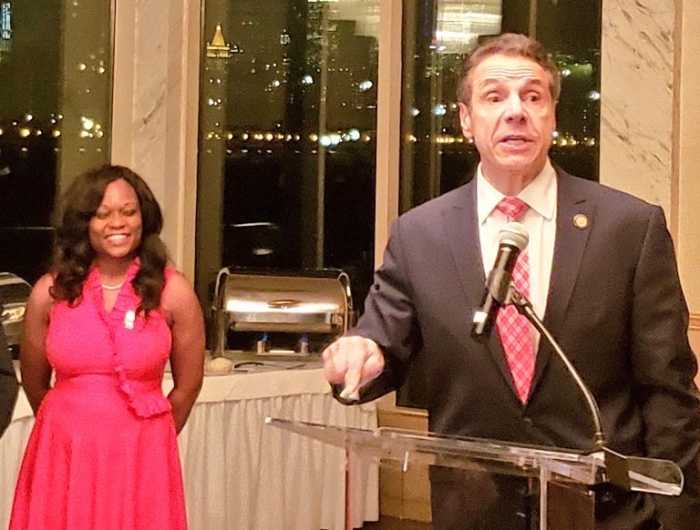The state Board of Elections announced Friday that petitioning for this year’s June primary would continue as scheduled following an appeal – likely to result in a stay – on an upstate judge’s Thursday ruling declaring new Congressional, state Senate and Assembly district lines unconstitutional.
“The March 31, 2022 order of the State Supreme Court Order (Harkenrider v Hochul, Sup. Ct. Steuben County Index No. E2022-0116cv Doc# 243) which declared the 2022 Congressional, Senate and Assembly lines unconstitutional has been stayed pending appeal,” the state BOE announced on Twitter Friday morning.
“The means that the filing period for designating petitions will remain April 4 to April 7 and all other deadlines provided for by law are still in effect pending further court determinations. All designating petitions must be filed during that time period.”
Judge Patrick McAllister – a Steuben County Supreme Court judge – issued the ruling Thursday evening that said the Democratic-controlled state legislature gerrymandered districts to benefit their own party. The decision came from a lawsuit brought by a group of Republican voters, and supported by top Republican lawmakers, that came shortly after the maps were signed into law February by Gov. Kathy Hochul.
McAllister ordered the legislature to throw the newly drawn Congressional, state Senate and Assembly maps by the wayside and start from scratch – giving them an April 11 deadline to draw and approve new lines. But state Senate and Assembly Democrats appealed the decision late Thursday night seeking a stay.
The state legislature took over the redistricting process after the new nonpartisan Independent Redistricting Commission twice failed to reach a consensus on a set of maps.
New York Law School Professor Jeffrey Wice – an expert on the state’s redistricting process – told PoliticsNY he doesn’t think McAllister’s ruling will derail this year’s primary. Additionally, Wice said, the decision faces an uphill battle in court when it goes before the New York State Court of Appeals in Albany.
“The New York Court of Appeals has not rejected any redistricting plan coming from the legislature in several decades,” Wice said. “And they hold these plans to a very high level of proof that you have to show beyond a reasonable doubt that the plans violated the Constitution and that the legislature acted in bad faith.”
Additionally, Wice said, there were several problems with both McAllister’s ruling and the plaintiffs’ case it was based on. Among the issues with McAllister’s decision were that he overlooked that several Assembly Republicans voted to approve the new maps proposed by the Democrats.
Also, Wice said, the judge issued his 18-page ruling only a few hours after the conclusion of closing arguments Thursday, when he had until Monday to make a decision.
“The judge seems to have pre-decided the case to issue this decision just hours later, despite the fact he had until Monday, April 4 to render his final decision,” Wice said.
On top of all that, Wice said he thought the state Senate and Assembly attorneys made strong cases that debunked testimony from the plaintiff’s expert witness.
They showed “that the analysis of the congressional plan was based on faulty data,” Wice said. “And that the expert, his theories had not been vetted, had not been peer-reviewed by other academic experts.”
Nevertheless, Republican lawmakers applauded McAllister’s ruling, which gave them some hope they wouldn’t have to compete in Democratic-drawn districts where they would likely lose.
One of those candidates is U.S. Rep. Nicole Malliotakis, whose majority Republican Staten Island and south Brooklyn district was redrawn to include the liberal bastion of Park Slope. The new district lines will almost certainly make Malliotakis’ seat in the general election more competitive against one of her Democratic competitors – former Congressman Max Rose or progressive activist Brittany Ramos DeBarros.
“It’s clear to all that Albany Democrats redrew our district to tilt the scale and steal our seat,” Malliotakis said in a statement. “It’s not just wrong, it’s also a violation of the State Constitution. We are encouraged by the action of the court and we await the new district maps.”
On the other hand, Iwen Chu, a candidate in the newly created south Brooklyn state Senate district 27, said there was a lot of thought that went into drawing the new district – which would be the first predominantly Asian state Senate district in Brooklyn.
“State Senate District 27 is a newly drawn district and was created after much public input during the redistricting process,” Chu said in a statement. “People in Senate District 27, regardless of party lines, deserve strong representation in the State Legislature. I will continue to engage with the residents regarding their under-represented concerns and needs.”
CORRECTION: A stay on Judge Patrick McAllister’s ruling striking down new district maps drawn by the state legilsature had not yet been issued Friday April 1, an earlier version of this story stated otherwise.










